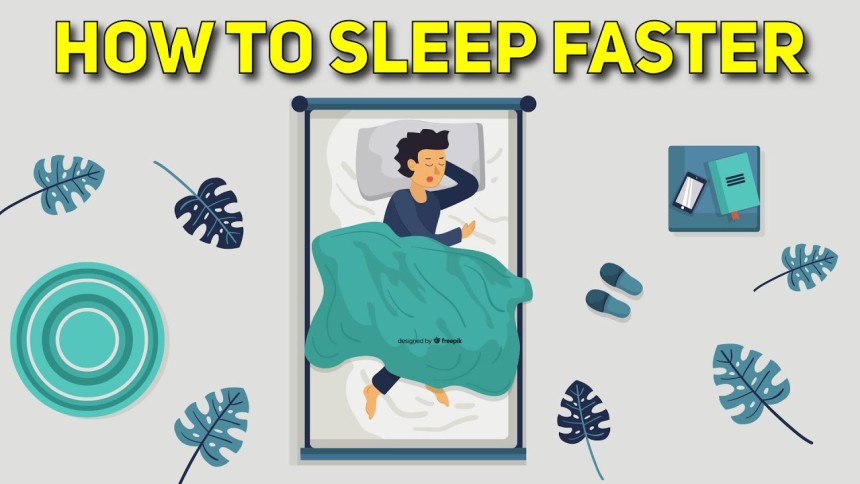
10 Science-Backed Tips for Achieving a Better Night's Sleep
#Tips #BetterSleep #Sleep #Science-Backed #BetterNight
Do you struggle with falling asleep or staying asleep throughout the night? You're not alone. According to the American Sleep Association, about 50-70 million adults in the US have a sleep disorder. Lack of sleep not only leaves you feeling tired and irritable, but it can also negatively impact your physical and mental health. Fortunately, there are science-backed tips that can help improve your sleep quality. Here are 10 tips for a better night's sleep.
1. Stick to a sleep schedule

One of the most important things you can do to improve your sleep quality is to stick to a consistent sleep schedule. This means going to bed and waking up at the same time every day, even on weekends.
What is a Sleep Schedule?
A sleep schedule is a routine that involves going to bed and waking up at the same time every day. Ideally, you should aim for 7-9 hours of sleep each night, and try to wake up and go to bed at the same time every day, even on weekends.
Why is Sticking to a Sleep Schedule Important?
Sticking to a sleep schedule is important for several reasons. First, it helps regulate your body's internal clock, also known as your circadian rhythm. Your circadian rhythm is responsible for regulating your sleep-wake cycle, and when it's disrupted, it can lead to sleep problems.
When you stick to a sleep schedule, you'll find it easier to fall asleep and stay asleep throughout the night. Your body will know when it's time to sleep and when it's time to wake up, which can help you feel more refreshed and energized during the day.
Additionally, sticking to a sleep schedule can help improve your overall sleep quality. When you consistently get enough sleep, your body will be better equipped to repair and rejuvenate itself, leading to better physical and mental health.
2. Create a bedtime routine
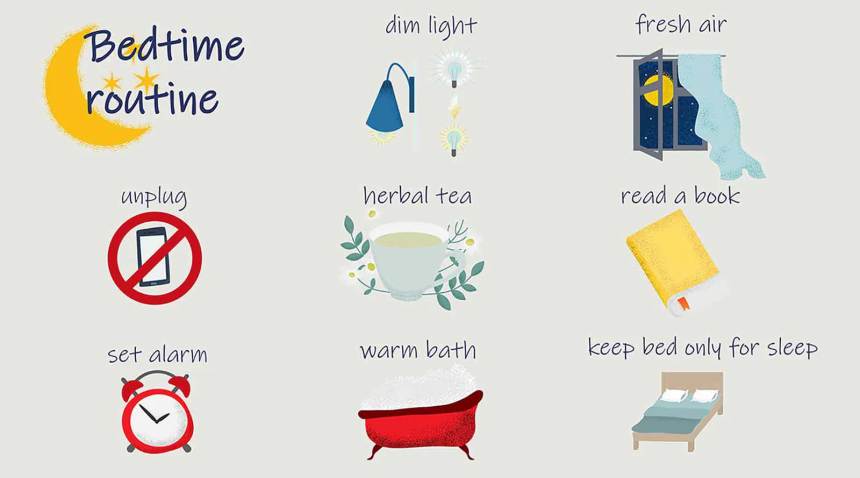
Creating a relaxing bedtime routine can help signal to your body that it's time to sleep. This routine could include activities such as reading a book, taking a warm bath, or listening to calming music.
Here are some tips for creating a relaxing bedtime routine:
- Set a specific bedtime: Establishing a consistent bedtime can help regulate your body's internal clock, making it easier to fall asleep and wake up feeling refreshed.
- Unplug from technology: The blue light emitted from electronic devices can interfere with your sleep by suppressing the production of melatonin, a hormone that helps regulate sleep. To avoid this, turn off electronic devices such as smartphones, laptops, and televisions at least 30 minutes before bedtime.
- Take a warm bath or shower: A warm bath or shower can help relax your muscles and soothe your mind, making it easier to fall asleep.
- Read a book: Reading a book is a great way to unwind before bedtime. Choose a book that is not too stimulating and preferably in a physical format rather than an electronic one.
- Practice relaxation techniques: Relaxation techniques such as deep breathing, meditation, or yoga can help reduce stress and promote relaxation, making it easier to fall asleep.
- Use aromatherapy: Essential oils such as lavender, chamomile, and vanilla are known for their relaxing properties. Adding a few drops of essential oils to your bathwater or diffusing them in your bedroom can help promote relaxation and better sleep.
- Dim the lights: Dimming the lights in your bedroom can help signal to your body that it's time to sleep. Use soft, warm lighting to create a relaxing ambiance in your bedroom.
3. Limit exposure to blue light
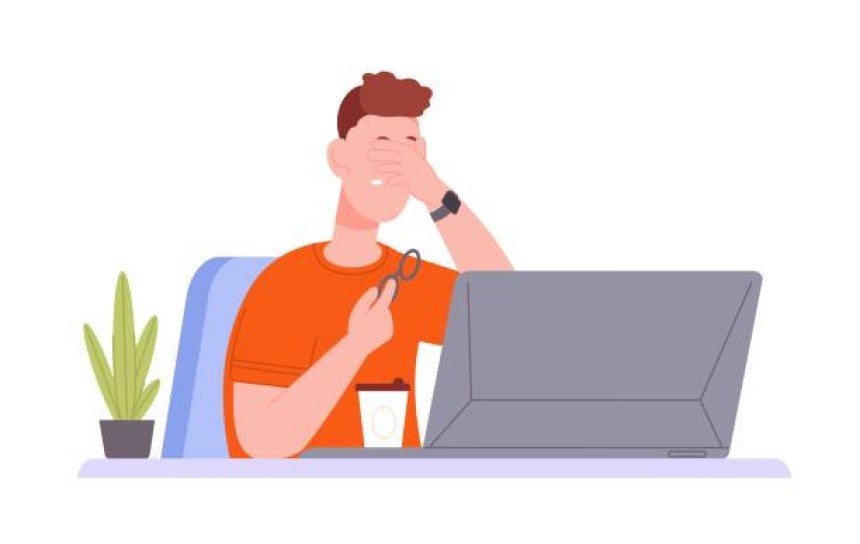
Blue light is a type of light that is emitted by electronic devices such as smartphones, tablets, and laptops. Exposure to blue light can interfere with our body's production of melatonin, a hormone that regulates our sleep-wake cycle. This can lead to difficulty falling asleep, staying asleep, and waking up feeling tired and groggy.
Fortunately, there are ways to limit your exposure to blue light and improve your sleep quality. One of the most effective ways to do this is to turn off electronic devices at least one hour before bedtime. This will give your body enough time to adjust and start producing melatonin, which will help you fall asleep faster and stay asleep throughout the night.
If you absolutely need to use electronic devices before bedtime, there are other ways to limit your exposure to blue light. One option is to use blue light filters, which are available on most electronic devices. These filters reduce the amount of blue light emitted by the screen, making it easier on your eyes and reducing the impact on your sleep.
Another option is to wear blue light-blocking glasses. These glasses are designed to block blue light and can be worn before bedtime to reduce your exposure to blue light. They are available in different styles and can be purchased online or at most eyewear stores.
It's also important to note that not all electronic devices emit the same amount of blue light. Some devices, such as e-readers, have built-in features that reduce the amount of blue light emitted. If you use an e-reader, consider using it instead of a tablet or smartphone before bedtime.
4. Avoid caffeine and alcohol before bedtime
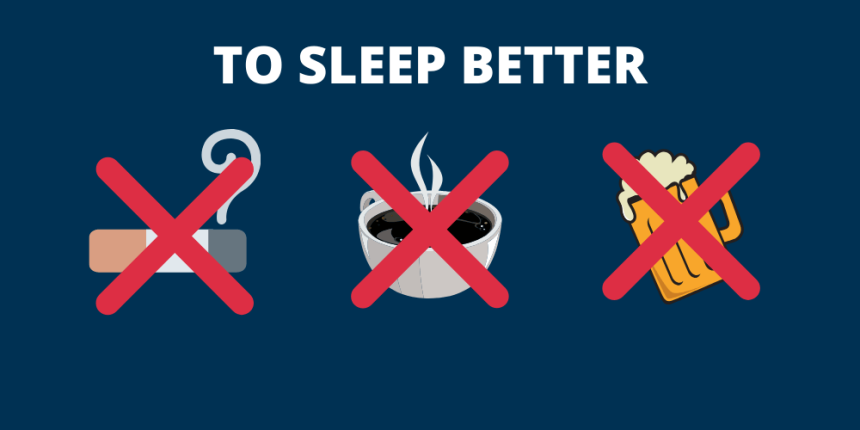
Caffeine is a stimulant that can make it difficult to fall asleep, so it's best to avoid consuming caffeine at least 6 hours before bedtime. Alcohol, on the other hand, may make you feel sleepy initially, but it can disrupt your sleep later in the night.
Commonly found in coffee, tea, energy drinks, and chocolate, is a stimulant that can keep you awake and alert. Caffeine blocks the effects of adenosine, a neurotransmitter that promotes sleepiness, and can increase the amount of time it takes to fall asleep. Caffeine also reduces the amount of deep sleep and REM sleep, which are important for memory consolidation and restoration.
If you're sensitive to caffeine, it's best to avoid consuming it at least six hours before bedtime. However, the time it takes for caffeine to leave your system varies from person to person, so it's important to pay attention to your body's response. Some people may need to cut off caffeine earlier in the day, while others may be able to tolerate it later.
Alcohol, on the other hand, is a depressant that can make you feel sleepy initially but can disrupt your sleep later in the night. Alcohol interferes with the normal sleep cycle, reducing the amount of REM sleep and increasing the number of awakenings. It also causes dehydration, which can lead to more frequent trips to the bathroom during the night.
While alcohol may help you fall asleep faster, it can lead to poorer sleep quality overall. If you do choose to drink alcohol, it's best to do so in moderation and avoid consuming it close to bedtime.
In addition to caffeine and alcohol, it's also essential to be mindful of other substances that can affect sleep, such as nicotine and certain medications. Nicotine is a stimulant that can interfere with sleep, and some medications, such as those for allergies or asthma, may contain ingredients that can cause sleep disturbances.
5. Keep your bedroom cool and comfortable
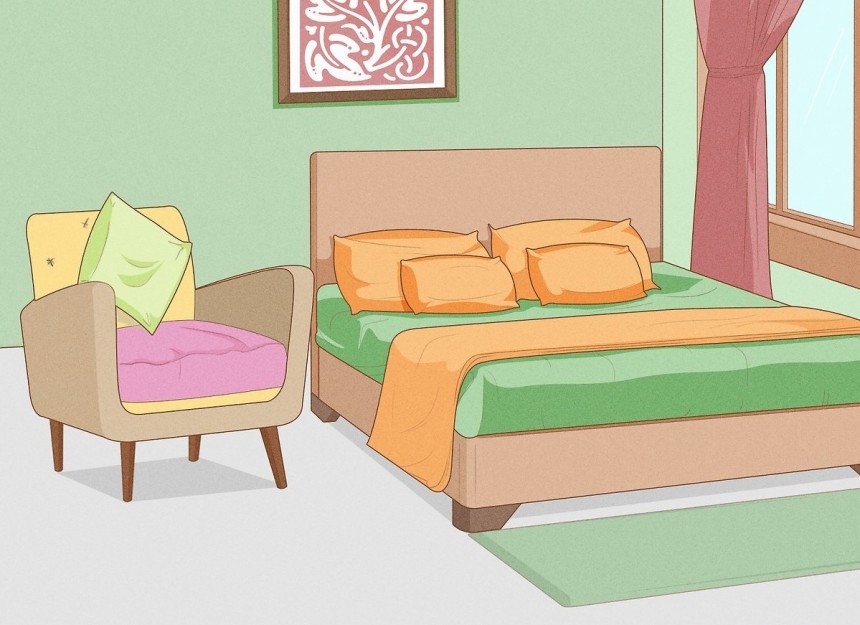
The ideal sleeping temperature is around 65°F (18°C). Keeping your bedroom cool and comfortable can help you fall asleep faster and stay asleep longer.
Why is bedroom temperature important for sleep?
Your body's core temperature naturally drops when you're asleep, and a cooler sleeping environment can help facilitate this process. A room that's too warm can interfere with your body's natural cooling process, making it more difficult for you to fall asleep and stay asleep. On the other hand, a room that's too cold can cause you to wake up throughout the night or prevent you from falling asleep in the first place.
How to achieve the ideal sleeping temperature
- Use the right bedding: Choosing the right bedding can make a significant difference in regulating your body temperature while you sleep. Natural fibers such as cotton and bamboo are more breathable than synthetic materials like polyester, which can trap heat and moisture.
- Adjust your thermostat: Set your thermostat to the ideal sleeping temperature of around 65°F (18°C). If you don't have a thermostat or it doesn't have temperature controls, consider investing in a portable air conditioner or a fan to help regulate the temperature in your bedroom.
- Keep your bedroom dark: Sunlight can heat up your bedroom during the day, making it more challenging to cool it down at night. Make sure to keep your bedroom dark during the day by using blackout curtains or blinds.
- Use a cooling mattress pad or pillow: Cooling mattress pads or pillows can help regulate your body temperature by absorbing heat and moisture, keeping you cool and comfortable throughout the night.
- Keep your bedroom clean and clutter-free: A cluttered and disorganized bedroom can affect the airflow in your room, making it more difficult to regulate the temperature. Keeping your bedroom clean and clutter-free can help maintain a comfortable sleeping environment.
6. Invest in a comfortable mattress and pillows
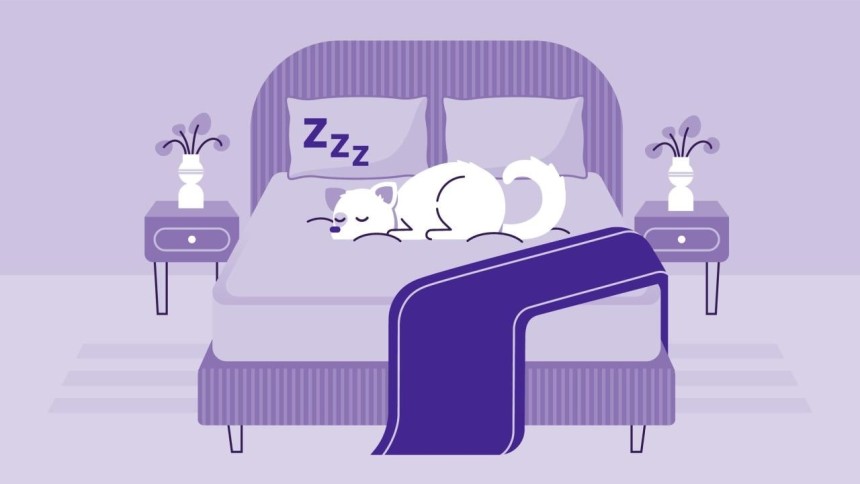
Your mattress and pillows can have a significant impact on your sleep quality. Make sure your mattress is comfortable and supportive, and your pillows are the right thickness and firmness for your sleeping position.
Getting a good night's sleep is essential for your overall health and well-being. One of the key factors that can influence your sleep quality is your mattress and pillows. If your mattress is uncomfortable or your pillows are too flat or too firm, you may experience aches and pains that can keep you awake at night. On the other hand, investing in a comfortable mattress and pillows can help you get the restful sleep you need to wake up feeling refreshed and energized.
When it comes to selecting a mattress, there are many different types and brands to choose from. Some popular options include memory foam, latex, and innerspring mattresses. Each type of mattress has its own unique features and benefits, so it's important to do your research and choose one that's right for you. Consider factors such as your sleeping position, body weight, and any health conditions you may have when selecting a mattress.
Memory foam mattresses are known for their pressure-relieving properties and ability to contour to the shape of your body. They are a great choice for people who suffer from back pain or joint pain. Latex mattresses are another popular option, offering a responsive and supportive sleep surface that can help relieve pressure points. Innerspring mattresses are a more traditional option, providing a bouncy and supportive sleep surface that can be comfortable for people who prefer a firmer feel.
In addition to choosing a comfortable mattress, it's also important to select the right pillows. The ideal pillow should provide adequate support for your head and neck, while also being comfortable and breathable. There are many different types of pillows to choose from, including down, memory foam, and latex pillows. Some pillows are designed specifically for side sleepers, while others are better suited for back or stomach sleepers.
When selecting pillows, consider your sleeping position and any neck or shoulder pain you may be experiencing. A good pillow should help keep your spine aligned while you sleep, reducing the risk of pain and discomfort. It's also important to replace your pillows regularly, as they can become less supportive over time.
7. Exercise regularly
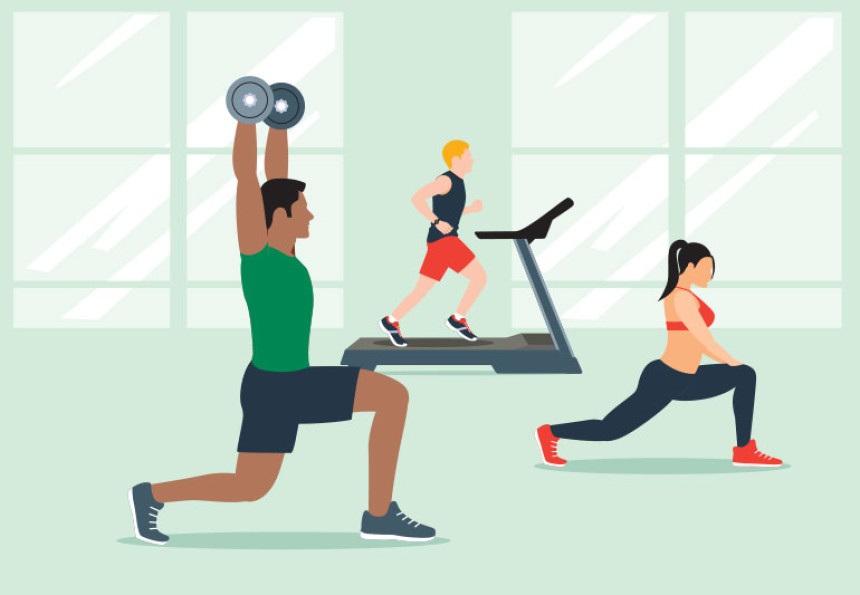
Regular exercise can help improve sleep quality, but make sure you finish your workout at least 3 hours before bedtime. Exercise stimulates the body, which can make it difficult to fall asleep if done too close to bedtime.
Getting regular exercise is crucial for maintaining good physical and mental health, but did you know it can also improve the quality of your sleep? In fact, studies have shown that people who exercise regularly tend to fall asleep faster, stay asleep longer, and experience a deeper, more restful sleep than those who don't.
The reason for this is that exercise helps to reduce stress and anxiety, which are two common factors that can interfere with sleep. When you exercise, your body releases endorphins, which are natural chemicals that help to boost your mood and reduce feelings of stress and anxiety. Additionally, exercise can help to regulate your body's internal clock, or circadian rhythm, which can help you feel more alert during the day and more tired at night.
However, it's important to note that the timing of your exercise can also have an impact on your sleep quality. While regular exercise is beneficial for sleep, exercising too close to bedtime can actually have the opposite effect. This is because exercise stimulates the body and raises core body temperature, both of which can make it more difficult to fall asleep. To avoid this, it's recommended that you finish your workout at least 3 hours before bedtime.
When it comes to choosing the right type of exercise for better sleep, the key is to find something that you enjoy and can stick with on a regular basis. Any type of physical activity can be beneficial, whether it's going for a walk, doing yoga, lifting weights, or participating in a team sport. Just make sure you listen to your body and don't push yourself too hard, especially if you're just starting out with a new exercise routine.
8. Practice relaxation techniques
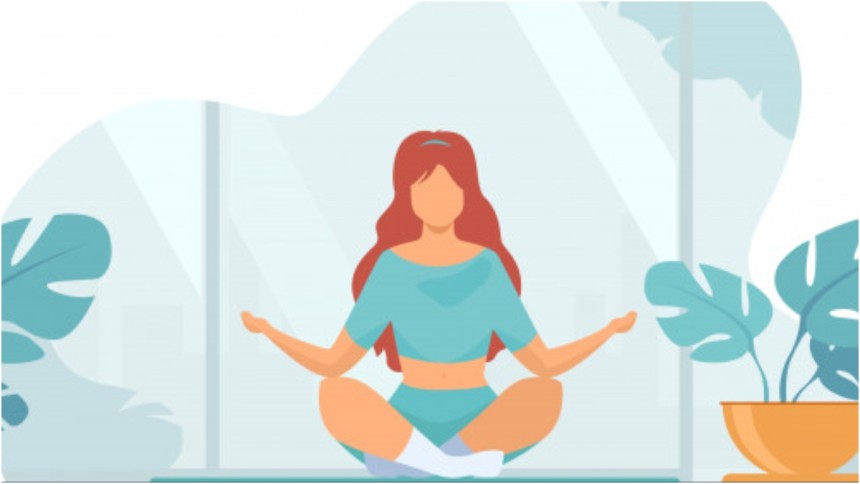
Relaxation techniques such as deep breathing, progressive muscle relaxation, and meditation can help reduce stress and promote relaxation, which can lead to better sleep.
Stress and anxiety can keep you awake, and poor sleep quality can make it difficult to function during the day. If you are struggling with sleep, incorporating relaxation techniques into your daily routine can be beneficial.
Relaxation techniques are easy-to-do exercises that can help you reduce stress, relax your muscles, and calm your mind. There are many different types of relaxation techniques to choose from, so it's important to experiment and find the ones that work best for you. Here are some examples of relaxation techniques that can help improve your sleep quality:
- Deep breathing: Deep breathing is a simple and effective relaxation technique that you can do anywhere, anytime. Sit or lie down in a comfortable position and take slow, deep breaths. Focus on your breathing, and try to clear your mind of any distracting thoughts.
- Progressive muscle relaxation: Progressive muscle relaxation is a technique that involves tensing and then relaxing different muscle groups in your body. Start by tensing your toes for a few seconds, then release the tension and relax your toes. Move up to your feet, legs, abdomen, chest, arms, and neck, tensing and relaxing each muscle group as you go.
- Meditation: Meditation is a mindfulness technique that involves focusing your attention on the present moment. Sit in a comfortable position and close your eyes. Focus on your breath, and when your mind starts to wander, gently bring it back to your breath.
- Visualization: Visualization is a technique that involves imagining a peaceful, relaxing scene in your mind. Close your eyes and picture a place that makes you feel calm and relaxed, such as a beach or a forest. Imagine yourself in that place, and try to engage all of your senses.
Incorporating relaxation techniques into your daily routine can be beneficial for improving sleep quality. By reducing stress and promoting relaxation, these techniques can help you fall asleep faster and stay asleep longer. Make it a habit to practice relaxation techniques daily, ideally before bedtime, to help your mind and body prepare for a good night's sleep.
9. Don't go to bed hungry or overly full
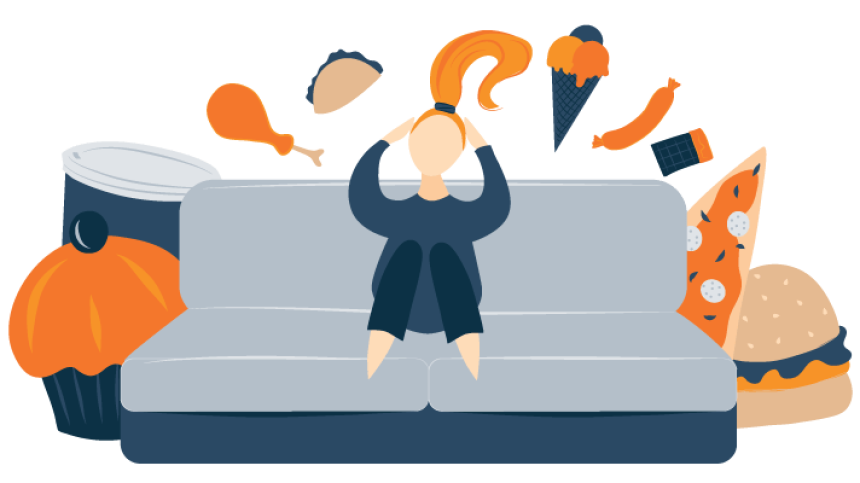
Going to bed hungry or overly full can interfere with your sleep. Aim to finish your last meal at least 2-3 hours before bedtime.
Going to bed hungry or overly full can lead to discomfort and can even disrupt our sleep. In this post, we'll take a closer look at why it's important to avoid going to bed hungry or overly full and offer some tips on how to strike the right balance.
When we're hungry, our bodies produce ghrelin, a hormone that stimulates our appetite. Ghrelin also plays a role in regulating sleep, and research has shown that increased ghrelin levels are associated with poorer sleep quality. On the other hand, going to bed overly full can lead to discomfort, indigestion, and even acid reflux, all of which can interfere with our sleep.
So, what's the right balance? It's recommended to finish your last meal of the day at least 2-3 hours before bedtime. This gives your body enough time to digest your food and avoid any discomfort or indigestion. If you do need a snack before bed, choose something light and easy to digest, such as a small piece of fruit, a handful of nuts, or a glass of warm milk.
It's also important to pay attention to what you're eating before bedtime. Certain foods, such as spicy or fatty foods, can cause discomfort and disrupt sleep. Caffeine and alcohol should also be avoided, as they can interfere with our sleep quality. Instead, choose foods that promote relaxation and sleep, such as bananas, cherries, and herbal teas like chamomile or valerian root.
In addition to paying attention to what we eat, it's also important to pay attention to how we eat. Eating too quickly or eating while distracted can lead to overeating and indigestion. Instead, try to eat slowly and mindfully, savoring each bite and paying attention to your body's hunger and fullness signals.
10. Consider using sleep aids

If you're still struggling with sleep despite making lifestyle changes, consider talking to your doctor about using sleep aids. Prescription and over-the-counter sleep aids can help improve sleep quality, but should only be used under a doctor's supervision.
Unfortunately, many people struggle with falling asleep or staying asleep throughout the night. While there are lifestyle changes you can make to improve your sleep, sometimes these changes aren't enough. In these cases, using sleep aids may be a helpful option.
It's important to note that sleep aids should only be used under a doctor's supervision. They can be effective in helping people fall asleep and stay asleep, but they also come with potential risks and side effects. Your doctor can help determine if sleep aids are a safe and appropriate option for you, and can recommend the best type of sleep aid based on your individual needs.
There are two main types of sleep aids: prescription and over-the-counter. Prescription sleep aids are usually reserved for people with severe sleep problems, such as insomnia. They are typically stronger and have a higher risk of side effects than over-the-counter sleep aids. Some common prescription sleep aids include Ambien, Lunesta, and Sonata.
Over-the-counter sleep aids are available without a prescription and are generally considered safe for short-term use. They are often used to help people with mild sleep problems, such as occasional insomnia. Over-the-counter sleep aids usually contain antihistamines, which can cause drowsiness. Some common over-the-counter sleep aids include diphenhydramine (found in brands such as Benadryl and Tylenol PM) and doxylamine succinate (found in Unisom).
It's important to follow the instructions on the label when using any type of sleep aid, and to avoid taking more than the recommended dose. Taking too much of a sleep aid can increase the risk of side effects, including dizziness, confusion, and daytime drowsiness.
It's also important to be aware of potential side effects and interactions with other medications. Some sleep aids can cause dry mouth, blurred vision, and constipation. They can also interact with other medications, including prescription medications and over-the-counter medications, such as allergy medications and pain relievers. It's important to talk to your doctor or pharmacist before using a sleep aid to avoid any potential complications.
When it comes to using sleep aids to improve sleep quality, one option to consider is Delta Sleep. Delta Sleep is a type of deep sleep that is essential for physical restoration and overall health. During Delta Sleep, your body repairs and regenerates tissues, strengthens your immune system, and releases hormones that regulate growth and appetite.
You can find more about this product HERE
In conclusion, improving your sleep quality is crucial for your overall health and well-being. By implementing these science-backed tips, you can improve your sleep and wake up feeling refreshed and energized. Remember, everyone's sleep needs are different, so it may take some trial and error to find what works best for you. Be patient and consistent, and you'll soon be on your way to a better night's sleep.
#sleep #how to sleep better #better sleep #sleep better #sleep tips #10 tips for better sleep #how to get better sleep #tips for better sleep #how to improve your sleep #science-backed tips #10 science-backed tips #science-backed sleep advice #tips on getting better sleep #better sleep tips #tips to sleep better #best way to sleep better at night #how to sleep #tips to get better sleep #science of sleep #better sleep tips #10 techniques to help you sleep better





